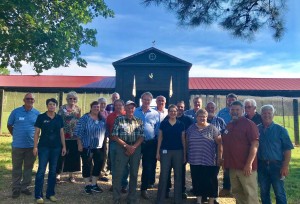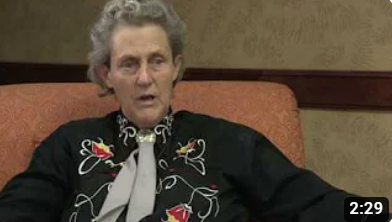
FOR IMMEDIATE RELEASE
Contact: Ryan Walker, Marketing & Communications Manager, The Livestock Conservancy
rwalker@LivestockConservancy.org, (940) 390-9713
Editor’s Note: Images available for download at: http://bit.ly/PoultrySummit
Interviews available upon request.
PITTSBORO, NC, USA [October 10, 2019] – In recent years, some domesticated large waterfowl and turkeys have experienced declines in populations and several key long-time breeders have been lost. These issues pose a threat to genetic diversity and the future of many historic breeds if actions are not taken. To explore ways to proactively address this problem, heritage and standard-bred poultry and livestock experts from throughout the United States and Canada convened for a historic summit on the topic. The event, co-hosted by The Heritage Poultry Conservancy, The Livestock Conservancy and The American Poultry Association took place at P. Allen Smith’s Moss Mountain Farm near Little Rock, Arkansas.
Several issues impacting domesticated poultry and waterfowl were identified at the summit and strategies to address them were developed. One of the leading issues identified by the group was insufficient access to educational resources. People breeding and raising the birds need access to good information about the skills and techniques required to successfully manage their flocks and market their products. Additionally, the general public and potential customers need to learn about the variety of products these birds offer. In order to address these needs, the American Poultry Association, The Livestock Conservancy, The Heritage Poultry Conservancy, Bird Shippers of America, The Good Shepherd Institute and commercial hatcheries including Metzer Farms and Murray McMurray, will work collaboratively to develop and share training resources for breeders and consumers.
Another issue for large waterfowl and turkeys is to develop response plans for exotic diseases tailored for the needs of small flocks. In 2014, a severe outbreak of Avian Influenza, or “bird flu,” resulted in the loss of nearly 50 million domesticated birds across the United States. Large areas of California and Arizona have been quarantined since 2018 in response to an outbreak of Virulent Newcastle disease. Small farms and flocks are not immune to threats like these, and endangered breeds of poultry within an outbreak zone would be especially impacted in terms of lost genetics.
Recruitment of new breeders must take place to protect and expand waterfowl and turkey populations. America’s farmers and poultry breeders are aging, and future generations of birds need future generations of breeders. Youth involvement through organizations like 4-H and FFA will be key to this growth. Efforts toward engaging more breeders in waterfowl and turkeys include events like the recent “Chicken Chat” at Moss Mountain Farm and the American Poultry Association sanctioned turkey show at the Ohio National Show in November will be the largest standard bred turkey show in recent times. Additionally, The Livestock Conservancy has made microgrants available for those looking at expanding their capacity to raise Heritage livestock and poultry.
At the conclusion of the meeting, the group toured the Heritage Poultry Conservancy’s collection of over 50 breeds of rare poultry at the farm. Summit participants agreed that in order to strengthen many of our large waterfowl breeds and turkey varieties, everyone involved will need to work together. These birds have a long history of use in American Agriculture and this summit is a first step in protecting their roles for the future.
###
For more information on the sponsoring groups and commercial attendees, please visit the following web sites:
American Poultry Association (APA) www.amerpoultryassn.com
The Livestock Conservancy www.livestockconservancy.org
The Heritage Poultry Conservancy https://pallensmith.com/heritagepoultryconservancy
Bird Shippers of America www.birdshippers.org
The Good Shepherd Institute https://goodshepherdconservancy.org/
Metzer Farms www.metzerfarms.com
Murray McMurray Hatchery www.mcmurrayhatchery.com
About The Livestock Conservancy:
The Livestock Conservancy is America’s leading nonprofit organization working to protect over 150 heritage breeds of livestock and poultry from extinction. Included are donkeys, cattle, goats, horses, sheep, pigs, rabbits, chickens, ducks, geese and turkeys. Founded in 1977, The Conservancy is the pioneer organization in the U.S. working to conserve historic breeds and genetic diversity in livestock. The Livestock Conservancy’s mission is “to protect endangered livestock and poultry breeds from extinction.”
Why are domestic breed of livestock and poultry in danger of extinction?
Modern agriculture and food production favors the use of a few highly specialized breeds selected for maximum output in intensively controlled environments. Many traditional breeds do not excel under these conditions, causing their popularity to decrease and leaving them faced with extinction. Although these breeds do not fit today’s mainstream model of agriculture, they are exquisitely suited for backyards and small to medium-sized farms.
Why is genetic diversity important?
Like all ecological systems, agriculture depends on genetic diversity to adapt to an ever-changing environment. Genetic diversity in domestic animals is revealed in distinct breeds, each with different characteristics and uses.
Traditional, historic breeds retain essential attributes for survival and self-sufficiency – fertility, foraging ability, longevity, maternal instincts, ability to mate naturally, and resistance to disease and parasites. As agriculture changes, this genetic diversity may be needed for a broad range of uses and opportunities. Once lost, genetic diversity is gone forever.
***
Editor’s Note: Images available for download at: http://bit.ly/PoultrySummit
Interviews available upon request.



